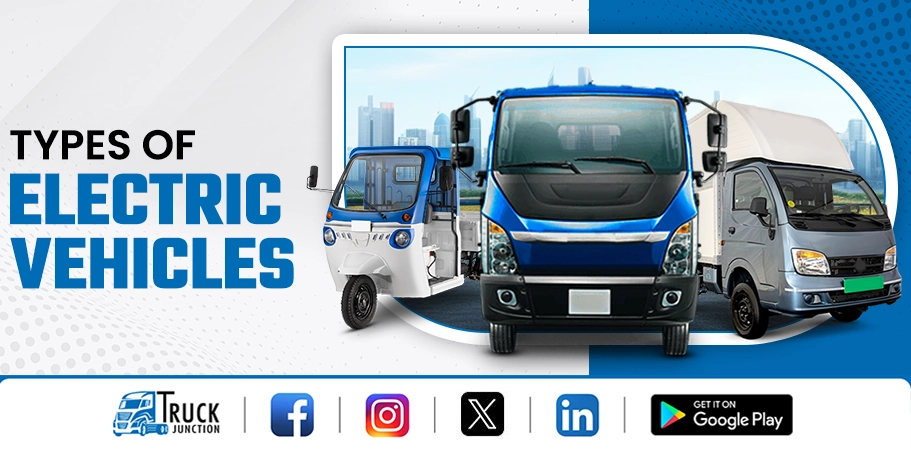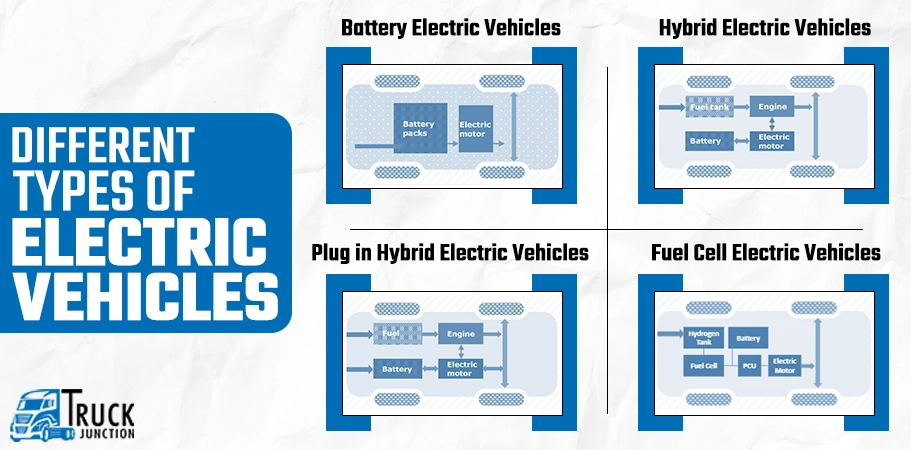Types of Electric Vehicles in India : A Complete Guide

Are you interested in electric vehicles but uncertain of where to begin? Our comprehensive guide for all types of electric vehicles is here to guide you!
Electric Commercial Vehicles (EVs) are becoming increasingly popular as individuals try to decrease their carbon footprints and support green drives. Also, EVs offer many advantages, including lower emissions, diminished fuel costs, and expanded energy productivity. However, with different electric vehicle types available, picking the right one can be challenging.
There are various types of EVs, including Battery Electric Vehicles (BEVs) that run exclusively on power, Plug-in Hybrid Electric Vehicles (PHEVs) that consolidate a battery with a fuel motor, and Hybrid Electric Vehicles (HEVs) that essentially use gas yet have electric help.
This blog will provide information on the types of EV vehicles, the advantages you really want in basic terms, and how they contrast with traditional gas combustion vehicles.
Different Types of Electric Vehicles

There are four fundamental types of electric vehicles accessible today. Here is a complete electric vehicles list, explaining the features, benefits, and environmental advantages of each.
1. Battery Electric Vehicles
BEVs or All Electric Vehicle (AEVs) run completely on battery power. Further, a huge battery pack stores power, which powers at least one electric engine. Also, you charge the battery by connecting it to the power framework. BEVs are perfect for diminishing outflows and fuel costs.
Fundamental Parts: Electric engine, inverter, battery, control module, drivetrain.
Working Standards:
- The battery supplies DC power, which is switched over completely to AC by the inverter.
- Squeezing the gas pedal conveys a message to the regulator, changing vehicle speed by changing the air conditioner power recurrence to the engine.
- The engine turns the wheels through a machine gear-piece.
- Slowing down or decelerating makes the engine act as an alternator, sending power back to the battery.
2. Hybrid Electric Vehicles
HEVs is also known as series or equal hybrids, have both a motor and an electric engine. Further, the motor uses fuel, and the engine uses power from batteries. Also, both work together to drive the wheels, further developing eco-friendliness.
Fundamental Parts: Motor, electric engine, battery load with regulator and inverter, gas tank, control module.
Working Standards:
- The motor and batteries power the vehicle at the same time.
- The gas tank supplies energy to the motor, while the electric engine uses battery power.
- Additionally, both can turn the transmission together, driving the wheels.
3. Plug in Hybrid Electric Vehicles
PHEVs likewise called series hybrids, utilise both a motor and an electric engine. Also, they can run on traditional fuel (like petroleum) or elective energy (like biodiesel). Further, the battery can be charged remotely or by the motor regeneratively slowing down.
PHEV Modes:
- All-electric Mode: The engine and battery provide all the energy.
- Hybrid Mode: Both power and fuel power the vehicle.
Fundamental Parts: Electric engine, motor, inverter, battery, gas tank, control module, battery charger.
Working Standards:
- PHEVs start in all-electric mode, utilising power until the battery is exhausted.
- When the battery is depleted, the motor dominates, and the vehicle works like a customary hybrid.
- PHEVs charge through outer power sources, the motor, or regenerative slowing down.
4. Fuel Cell Electric Vehicles
FCEVs are also famous for Zero Emission Vehicles. It uses fuel cell innovation to produce power from the compound energy of fuel. Further, the power drives the vehicle, making FCEVs profoundly productive and eco friendly.
Fundamental Parts: Electric engine, energy component stack, hydrogen capacity tank, battery with converter and regulator.
Working Standards:
- FCEVs create power on board to control the engine.
- Hydrogen from the capacity tank responds in the energy component stack, delivering power.
Electric Vehicles in India
India is quickly embracing electric vehicles, with a developing business sector for different EV types. Further, the electric vehicles list in India includes choices for all inclinations and financial plans, from reasonable electric rickshaws and automobiles to good quality electric vehicles.
Popular Electric Vehicles in India
Among electric rickshaws, high quality and reasonableness make them ideal for urban driving and short distance travel. For electric autos, popular choices offer high performance, low support expenses, and productivity.
Additionally, electric trucks are emerging as reliable options for heavy-duty transportation, while electric pickups provide versatile solutions for various cargo needs. Electric 3 wheeler are gaining popularity for their efficiency in urban areas, and electric trailers are becoming essential for hauling industrial goods.
Electric mini trucks are preferred for their compact size and maneuverability in tight spaces, and electric tempo travellers are notable for their capacity and comfort in passenger transport. These vehicles are significantly contributing to the shift towards eco-friendly transportation in India.
Electric Commercial Vehicles by Category:
-
Electric E Rickshaw:
E Rickshaw Prices in India range from Rs 0.58 Lakh to Rs 1.89 Lakh*, with the Reep Electro OTO being the most expensive at Rs 1.85 Lakh*and the SN Solar Energy New Passenger being the least expensive at Rs 0.58 Lakh*.
-
The Electric 3-Wheelers:
These vehicles cost between Rs 0.59 Lakh and Rs 5.60 Lakh. Further, the top models are the Mahindra Treo Zor, Piaggio Ape E Xtra, and Atul Elite Cargo.
-
Electric Auto Rickshaw:
The price range for Electric Auto Rickshaw is Rs 1.12 Lakh to Rs 4.10 Lakh*, with notable models including the Mahindra Treo, Piaggio Ape E City Fx, and Kinetic Safar Smart.
-
Electric Trucks:
In India, Electric Trucks cost between Rs 15.29 Lakh and Rs 16.82 Lakh. Further, popular models include the Tata Ultra T.7 Electric, Ashok Leyland Boss 1218 HB EV, OSM M1KA 1.0, and Tata Ultra E.9.
-
Electric Mini Trucks:
The cost of Electric Mini Trucks ranges from Rs 7.75 Lakh to Rs 12.66 Lakh*, with Tata and E-Trio as key brands, including models like the Tata Ace EV and E-Trio Logistics.
-
Electric Tippers:
Brands like Tata and Olectra offer Electric Tippers, including models like the Tata Prima E.28k and Olectra 6×4, which are cost-effective alternatives to diesel tippers.
-
Electric Tempo Traveller:
Electric Tempo Traveller features brands like Tata and Mahindra. Further, it includes the Tata Magic EV and Mahindra E-Supro Cargo, with prices for the Mahindra E-Supro Cargo Van ranging from Rs 8.45 Lakh to Rs 8.75 Lakh*.
-
Electric Pickup Truck:
Jupiter offers Electric Pickup Truck such as the Jupiter EV Star CC and Jupiter Jem Tez, with new models launched at the Indian Auto Expo 2023.
-
Electric Trailer:
The AVTR 5530 AN EV from Ashok Leyland is famous for its durability and reliability in Electric Trailer. It is a notable model in the electric trailer segment designed for hauling industrial goods.
Conclusion
We have explored the four types of electric vehicles, BEVs, PHEVs, HEVs, and FCEVs, alongside the types of EV vehicles accessible in India and their costs. Further, each type offers extraordinary advantages of electric vehicles, so exploring them is urgent prior to choosing to think about your requirements. Also, EVs can fundamentally diminish your carbon footprint and provide dependable transportation.
With different choices accessible, there’s certain to be an EV that meets your requirements impeccably. Take as much time as necessary, get clarification and decide wisely for a greener future. However, understanding the different types of electric vehicles and their advantages will assist you in making the ideal choice. Whether you’re looking at the types of electric vehicles in India or worldwide, there is an option for everybody.
Related Blogs:
Top 10 Electric Vehicles in India
Future of The Electric Vehicles in India



